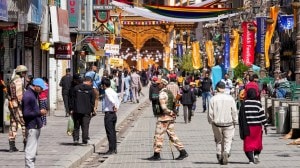State plan on hire-n-fire industrial zones atrocious — Justice Iyer
MARCH 11: Justice (Retd) V R Krishna Iyer on Saturday termed as ``atrocious'' Chief Minister Vilasrao Deshmukh's recent announcement of ha...

MARCH 11: Justice (Retd) V R Krishna Iyer on Saturday termed as “atrocious” Chief Minister Vilasrao Deshmukh’s recent announcement of having “hire and fire” industrial zones in the State where no labour laws will apply.
“It will be something like Chernobyl (which had a nuclear fallout) where no man will be able to enter,” he said at a seminar, envisaging that while no trade union would allow the opening of such sectors, companies which try to do so would be risking themselves. “Don’t drive the labour force to violence,” he cautioned as he spoke of the dwindling concerns for labour in a country where 90 per cent of the workforce belongs to the unorganised sector.
Justice Iyer’s heartfelt rhetoric on protecting the country’s labour force as well as its industry – though short on specifics – belied the fears expressed by a section of trade unions and labour lawyers that the seminar organised by the Federation of Labour Law Practitioners’ Association would espouse the cause of the management companies. Instead, every speaker beginning with Justice M B Shah of the Supreme Court spoke for labour, of more laws reaching out to those in the lowest rung, women in the construction sector, bonded labourers, child labour and the unorganised sector.
The national seminar, `Need for Changes In Labour Laws for 21st Century’, came at an opportune time with the announcement of Deshmukh’s industrial zones. A subdued Sharad Rao, trade unionist and general secretary of the Hind Mazdoor Kisan Panchayat, expressed surprise that even though four lakh industrial units had closed down after the new economic policy was introduced in the country in 1991, causing largescale unemployment, there was still no consensus on protecting the country’s labour force.
“Instead you have industries closing up, stopping manufacturing and becoming traders, sourcing their products from job-works and contract labour. The bargaining power of the organised sector is fast vanishing,” he said. He blamed the new industrial policy of liberalisation, `where you have labour laws, a policy dictated by GATT and WTO which increases the dependency on the judiciary’.
And while, the developed countries have strong laws where a company failing to pay minimum wages to its workers can be penalised, there are no such provisions in the developing countries, he stated. Regarding the announcement of such labour law-free zones, he pointed out that such announcements only undo all the conventions signed by various countries under the aegis of the International Labour Organisation.
He also argued that the judiciary is under “pressure of such a campaign” to acknowledge such policies though they may be violative of the laid down laws. “Seeking an Industrial Disputes Act where companies are free to follow retrenchment and closures, will only add to unemployment and exploitation,” he said and warned that unless this is taken care of, there will be a collapse of law and order.
Exhorting the judiciary to rise up to the occasion where “interpretative jurisprudence” is needed, Justice Iyer felt that the credibility of the judiciary that is still there should be sustained. “Judges must be active sentinels of the Constitution and must be conditioned by the ground reality of the country,” he said.
In his address, K K Nohria, President, Bombay Chamber of Commerce and Industry (BCCI), said that after liberalisation the role of the management of companies was as difficult as a worker’s job and all companies know today that they have to involve labour in its decisions. “As far as exploitation of labour is concerned, it is a thing of the past in the organised sector…productivity does not only concern labour today, but various other aspects like machinery, overheads etc…what is needed is to create a right attitude between labour and industry”.



- 01
- 02
- 03
- 04
- 05



























